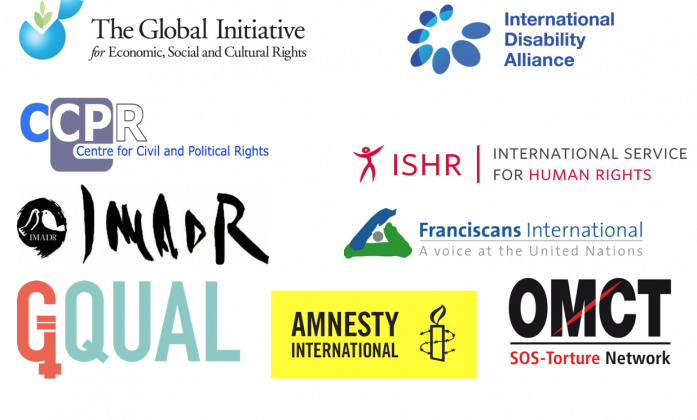
IDA and the Global Initiative for Economic, Social and Cultural Rights, along with other NGOs are presenting an oral statement at the 33rd Session of the Human Rights Council on Gender Parity to the UN monitoring mechanisms.
Joint NGO Oral Statement at the 33rd Session of the Human Rights Council
Geneva, Monday September 26
Last year this panel discussed gender parity in international human rights bodies, including the Human Rights Council and its mechanisms.
States resolutely called for the redoubling of efforts to improve gender balance on UN human rights bodies and mechanisms, courts and tribunals and specialised agencies. Unfortunately, since then, the gender balance on these bodies has not improved and, in some cases, it has worsened.
For instance, for the Special Procedures mandate holders, the most recent figures are for 31 December 2015, when a total of 37 per cent of mandate holders were female and 63 per cent were male.[1]
The situation in the treaty bodies is particularly disturbing. At 1 January 2016, out of a total of 172 treaty body members - if we take out CEDAW members - the representation of women in the membership of the treaty bodies is 31 per cent.[2]
Illustrative of the negative trend is the recent elections in the Committee on the Rights of Persons with Disabilities which had the result that there will be only 1 female member amongst 17 male members, from 1 January 2017.
It is also important to recall that the current Bureau of the Human Rights Council is comprised entirely of men. It is disappointing to observe that since the commencement of the Council there has been only 1 female President compared with 9 male Presidents.
We should be alarmed by these outcomes. Despite commitments and fine words in resolutions and treaties, actions have not followed.
We call on States to take active measures to significantly increase the number of women on UN bodies - the human rights treaty bodies, Special Procedures and the HRC Bureau itself - by, for instance:
- establishing safeguards to increase participation of women candidates in the process for proposal of candidates, including with more inclusive national processes;
- supporting women candidates within the Regional Groups;
- establishing and using a gender-sensitive guide in the interviewing of candidates for the Special Procedures.
We believe that the situation calls for special measures – that is, the institution of objective and concrete targets, quotas, guidelines for nomination and voting, and other measures that require State delegations to the UN to pay attention to gender balance at the point of soliciting candidates, nomination of candidates and voting.
Thank you
Contacts:
Global Initiative for Economic, Social & Cultural Rights
Lucy McKernan, Geneva Representative
lucy [at] globalinitiative-escr.org
International Disability Alliance
Tchaurea Fleury, Senior Officer
tfleury [at] ida-secretariat.org
[1] A/HRC/31/39 para 4
[2] Annexes to the Secretary-General’s report on the Status of the human rights treaty body system (A/71/118), p 35
Organisations (and logos displayed above): the Global Initiation for Economic, Social and Cultural Rights, the Centre for Civil and Political Rights, IMADR, Franciscans International, International Disability Alliance, International Service for Human Rights, and Amnesty International
